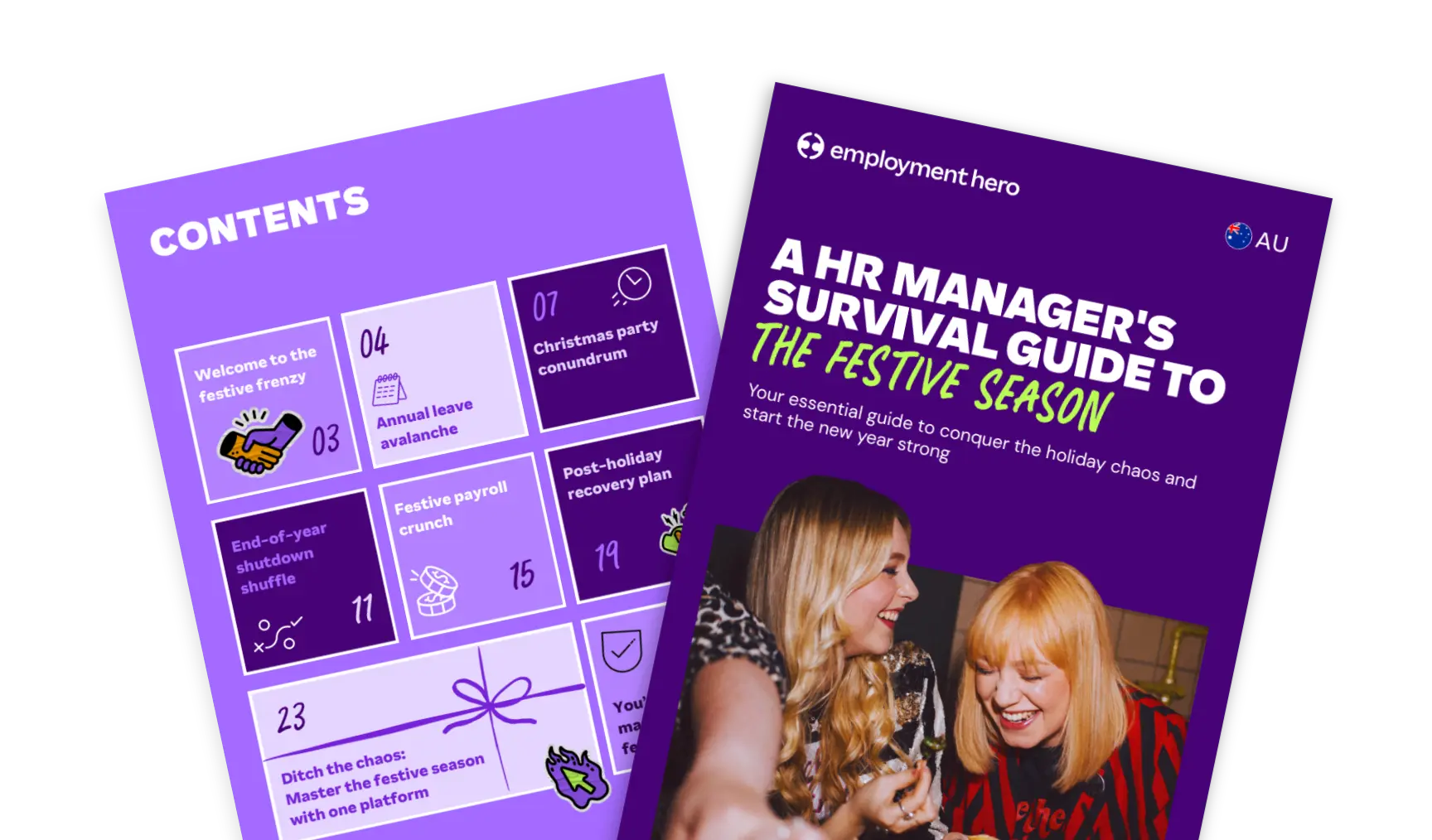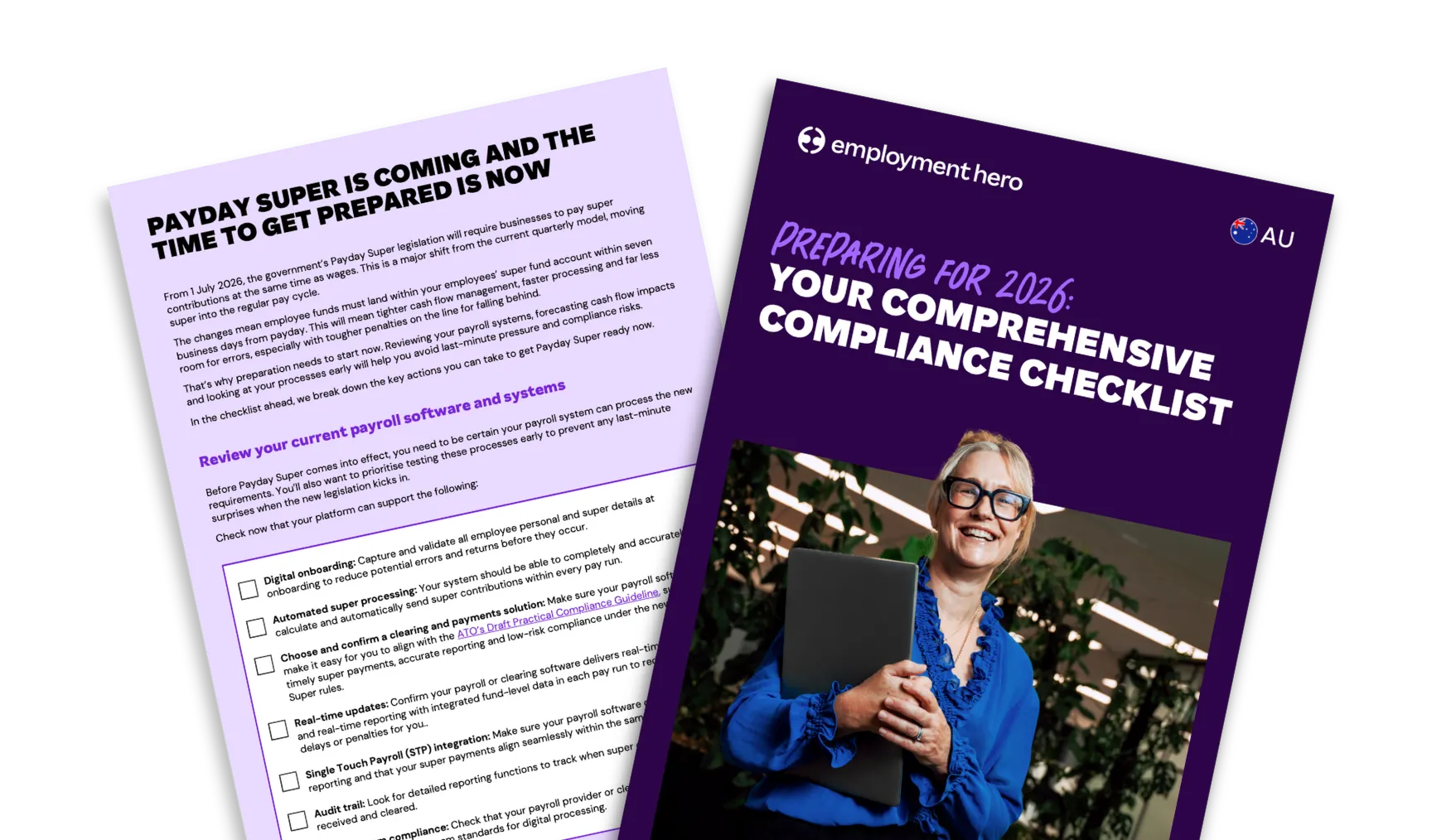Workplace drug and alcohol policy template
Published
Workplace drug and alcohol policy template
Is your workplace drug and alcohol policy robust enough to protect your company when incidents occur? Or worse, do you lack one entirely? When drug and alcohol issues surface in the workplace, unpreparedness can lead to legal exposure, compromised safety and damaged team morale.
What’s in this workplace drug and alcohol template?
This policy template provides you with the essential framework to protect your people and your business. We’ve designed this resource to be adaptable to your specific workplace needs.
This straightforward drug and alcohol policy template will help you:
- Protect everyone on your premises with comprehensive guidelines that help prevent incidents before they happen;
- Outline that Company vehicles are not to be driven by anyone who is under the influence of alcohol or drugs; and
- Maintain productivity levels and achieve business goals.
This template does not include requirements for drug and alcohol testing, as these can be complex and vary by workplace. If your business requires testing procedures, our HR Advisory team help.
What is a workplace drug and alcohol policy?
Meanwhile, larger organisations need consistent approaches that managers can apply across all departments.
Whether you’re running a construction company with heavy machinery or a small office-based business, a well-crafted policy protects both your team and your organisation.
A Workplace Drug and Alcohol Policy is a type of workplace policy that helps everyone understand the rules about substance use in a workplace setting. Small businesses often think they don’t need formal policies until they face their first substance-related incident. By then, handling the situation fairly becomes much more challenging without established guidelines.
A thoughtful policy matters because it:
- Prevents misunderstandings about what’s acceptable at work and work events
- Gives managers clear steps to follow when concerns arise
- Creates fair, consistent handling of sensitive situations
- Demonstrates your commitment to workplace safety
- Provides pathways to support employees who seek assistance
What are the consequences of inadequate drug and alcohol policies on your organisation?
The impact on occupational health and safety
As a business leader, your occupational health and safety obligations require you to create a work environment where everyone can perform safely. When employees are impaired by drugs and alcohol, that safety is compromised.
Your drug and alcohol policy helps you fulfill these legal requirements while demonstrating your commitment to employee wellbeing.
Misconduct can impact performance
Drug and alcohol use in the workplace is typically considered a misconduct issue, but it can also affect an employee’s ability to perform their role safely and effectively.
By documenting incidents clearly and consistently, you protect your organisation legally while ensuring fair and transparent processes. This approach helps your leadership team address misconduct with confidence while supporting employees who may need help.
The impact on high risk duties
When someone’s operating a forklift or driving clients around, being impaired isn’t just a performance issue, it’s one that could put people in real danger.
That is why the policy needs to outline situations when an employee is under the influence of prescription drugs or alcohol, if their role requires them to operate machinery.
Impact on team culture and morale
When you ignore drug and alcohol issues, your team notices. This is especially true if coworkers are carrying an increased workload because of it. And it’s not just your team that feels it, your customers and clients can also pick up on the tension. The result? The potential for unnecessary conflicts both and out of the workplace.
What is workplace drug testing, and why is it important?
While drug and alcohol testing can be an important step for some workplaces, our standard policy template does not include testing provisions. This is because implementing a testing program can be complex, with different legal and procedural requirements depending on your industry and location. If you’re considering adding testing to your workplace policy, our HR advisory team can guide you through the process and help you develop a tailored policy that meets your specific needs.
In general, workplace drug testing involves screening employees for substances that might affect their performance, safety, behaviour at work and overall health. Common scenarios for testing can include:
- During pre-employment screening
- As part of random testing programs
- When reasonable suspicion exists
- Following workplace accidents
- Before returning to work after treatment
Testing can provide objective data to support workplace safety measures and help employers take action where impairment poses risks. In safety-critical roles, some workplaces choose to apply more stringent standards and testing frequencies.
Courts generally support testing programs that are clearly communicated, consistently applied, and proportionate to legitimate safety concerns. If you need testing procedures that are compliant and effective, our HR Advisory team can help you create a tailored policy.
Step-by-Step Guide to Writing Your Policy
Whether you’re starting from scratch or updating an existing policy, following a structured process will help you produce a document that’s practical, enforceable, and supported by your team.
- Know the law: Start by mapping the legal requirements in your industry and location. This ensures your policy has a strong legal foundation and avoids overlooking compliance.
- Get the right voices involved: Bring in managers, HR, legal experts, and employee reps. A policy created in isolation is less likely to be fair, workable, and supported.
- Write with purpose: Clearly define who’s covered, prohibited behaviours, available support, potential testing procedures (if relevant), and disciplinary outcomes.
- Test and refine: Share your draft with a trusted group to check for clarity, tone, and real-world practicality.
- Roll it out well: Communicate the policy in plain language, train managers on applying it consistently, and make it easy for employees to find.
- Keep it fresh: Review it regularly, at least annually, so it reflects current laws, company priorities, and any lessons learned.
The clearer your process, the easier it will be to enforce your policy fairly and maintain a safe, respectful workplace. Work performance incidents
How can Employment Hero help?
Implementing a thoughtful drug and alcohol policy demonstrates your commitment to creating a workplace where everyone can perform at their best in an environment that prioritises both safety and support. Our workplace alcohol and drugs policy template helps to create guidelines everyone will understand.
Simplify your workplace policy management with our Employment Operating System. Book a demo today to see how our software can streamline your policy administration while strengthening compliance and saving valuable time for your HR team.
Disclaimer: The information in this article is current as at 26 June 2025, and has been prepared by Employment Hero Pty Ltd (ABN 11 160 047 709) and its related bodies corporate (Employment Hero). The views expressed in this article are general information only, are provided in good faith to assist employers and their employees, and should not be relied on as professional advice. The Information is based on data supplied by third parties. While such data is believed to be accurate, it has not been independently verified and no warranties are given that it is complete, accurate, up to date or fit for the purpose for which it is required. Employment Hero does not accept responsibility for any inaccuracy in such data and is not liable for any loss or damages arising either directly or indirectly as a result of reliance on, use of or inability to use any information provided in this article. You should undertake your own research and to seek professional advice before making any decisions or relying on the information in this article.
Frequently Asked Questions
No, testing is not included in this template, but our HR Advisory team can help you explore custom testing protocols, including other drug testing methods, if your workplace requires them.
Depending on the context, refusal may be treated as a policy violation. In safety critical positions, where impairment could pose serious risks, refusal to follow policy may lead to immediate action. Our HR Advisory team can provide tailored guidance for these situations.
While it sets expectations and guidelines, local laws apply. For example, rules around the legal blood alcohol level may differ by state or industry.
You should review your policy annually at a minimum, or sooner if legal or organisational circumstances shift.
Yes. Our policy clearly prohibits the possession, use, or distribution of illegal drugs in the workplace or during work-related activities. This helps ensure compliance with the law and protects employee safety.
All employees have access to our grievance and complaints process. This provides a safe, confidential way to raise concerns, whether about suspected breaches, testing procedures, or fairness in enforcement, without fear of retaliation.
To download the policy template, we just need a few quick details.
Related Resources
-
 Read more: HR Managers: Don’t just survive the festive season, master it
Read more: HR Managers: Don’t just survive the festive season, master itHR Managers: Don’t just survive the festive season, master it
Make year-end easier: manage leave, payroll, parties and shutdowns with confidence. Get practical tips for Australian SMEs. Download the free…
-
 Read more: Preparing for 2026: Your Compliance Checklist
Read more: Preparing for 2026: Your Compliance ChecklistPreparing for 2026: Your Compliance Checklist
Get your business ready for the 1 July 2026 changes. See practical steps for Payday Super, cash flow planning and…
-
 Read more: Monthly business budget template for employers
Read more: Monthly business budget template for employersMonthly business budget template for employers
Plan your monthly income and expenses with our free monthly business budget template. Download today to track cash flow and…























